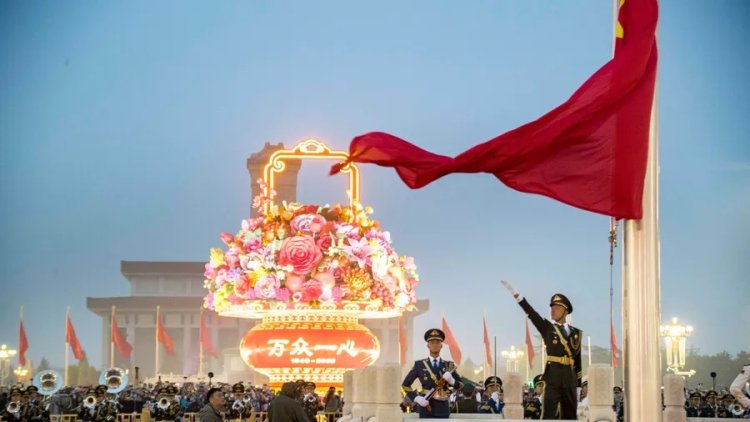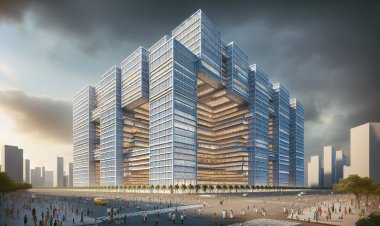China's Transformation: From Poverty to Prosperity
"Embark on an insightful journey through China's remarkable transformation from a poverty-stricken nation to a global economic powerhouse. This article delves into the pivotal changes, policies, and innovations that fueled China's rapid rise to prosperity and its impact on the world stage."

China's Transformation: From Poverty to Prosperity
Introduction
China's astonishing growth and speed of change over the last 40 years are truly remarkable. The scale of its growth and sheer speed of change are unlike anything we have ever seen before. This transformation has led to a shift in the balance of power in the world as China rises to become an engine of global capitalism. But how exactly did China achieve this economic success?
Just 40 years ago, China was an impoverished and backward communist country. However, under the leadership of Deng Xiaoping, China renounced class struggle and embraced the market. This marked the beginning of the biggest lifting of people out of poverty in human history. Today, China is a global economic force and is predicted to become the world's biggest economy in the next couple of decades.
But what actually happened 40 years ago, and how did China achieve such tremendous success? With a population of 1.4 billion people, China has faced numerous challenges in its modernization process. For centuries, China has been engaged in a struggle over the different pathways to modernity. From being a leading nation over 1,000 years ago, China experienced a decline starting in the early 17th century. It suffered colonial oppression, Japanese invasion, and civil war, which led to a century of humiliation.
However, China's journey towards economic success began when Deng Xiaoping came into power. Deng had a vision for China to become more prosperous and recognised the importance of stability and economic efficiency. He realised that the rigid ideology of Mao Zedong had wrecked China's economy and that a new path was needed.
Through a series of reforms, including opening up to foreign investment, allowing private businesses to flourish, and investing in education and technology, China gradually transformed its economy. The country embraced science, technology, and market forces, leading to the rapid growth and development we see today.
China's economic success has not only changed the country itself, but it has also had a significant impact on the balance of power in the world. China's rise as an economic powerhouse has challenged the dominance of Western countries and has positioned China as a global leader in various industries, including artificial intelligence and green technology.
As we delve deeper into China's transformation from poverty to prosperity, it is essential to understand the factors that contributed to its success. By examining China's economic policies, its focus on education and innovation, and its ability to adapt to changing global dynamics, we can gain valuable insights into the remarkable journey of this nation.
China's Path to Modernity
China's history as a leading nation for over 1,000 years is a testament to its ability to innovate and adapt. From inventing paper and gunpowder to establishing the world's first civil service exam system, China was at the forefront of technological advancements and intellectual achievements.
However, in the 17th century, China experienced a decline and struggled to maintain its position as a global power. The country faced challenges such as colonial oppression, Japanese invasion, and civil war, which led to a century of humiliation. These traumatic events deeply impacted the Chinese people and left a lasting impact on the nation.
Despite these struggles, the Communist triumph in 1949 marked a turning point for China. Under the leadership of Mao Zedong, the country embarked on a path towards communism, hoping to bring peace and stability to a war-torn nation. However, Mao's rigid ideology and disastrous economic policies led to the Great Famine and the Cultural Revolution, causing further suffering for the Chinese people.
It was not until Deng Xiaoping came into power in the late 1970s that China's modernization truly began. Deng recognised the failures of Mao's policies and saw the importance of embracing market forces and economic efficiency. Through a series of reforms, China opened up to foreign investment, allowed private businesses to flourish, and invested in education and technology.
China's economic success over the past 40 years has been unprecedented. The country has transformed from an impoverished and backward communist nation into a global economic powerhouse. Its focus on science, technology, and market forces has propelled it to become the world's second-largest economy and a leader in industries such as artificial intelligence and green technology.
China's rise as an economic powerhouse has not only impacted the country itself but has also challenged the dominance of Western countries. Its economic success has shifted the balance of power in the world, making China a global leader in various sectors. The country's Belt and Road Initiative, which aims to connect Asia, Europe, and Africa through infrastructure projects, further solidifies China's position as a global leader.
While China's economic success is undeniable, it is important to recognise the challenges it still faces. China's political system, based on one-party rule, has led to concerns about human rights and a lack of political freedom. The country's rapid economic growth has also led to environmental issues, including pollution and climate change.
As China continues its path to modernity, it will need to address these challenges and find a balance between economic development, political reform, and environmental sustainability. Only by doing so can China truly achieve a prosperous and sustainable future for its people and maintain its position as a global leader.
The leadership of Deng Xiaoping
Deng Xiaoping's pragmatism and vision for change:
Deng Xiaoping was a pragmatic leader who had a clear vision for China's future. He recognised the failures of Mao's policies and understood the importance of embracing market forces and economic efficiency. Deng's pragmatism allowed him to prioritise stability and economic development over rigid ideology, leading to significant changes in China's economy and society.
The damage caused by Mao's policies:
Mao Zedong's rigid ideology and disastrous economic policies caused immense damage to China's economy. The Great Famine and the Cultural Revolution resulted in widespread suffering and economic decline. Deng Xiaoping understood the need to undo the damage caused by Mao's policies and set China on a new path towards prosperity.
Deng's return from exile and his push for economic reform:
After spending years in exile during the Cultural Revolution, Deng Xiaoping returned to power in the late 1970s. He was determined to change China's direction and push for economic reform. Deng's leadership and reforms allowed China to open up to foreign investment, encourage the growth of private businesses, and invest in education and technology.
The significance of the first exams in 1977:
In 1977, Deng Xiaoping initiated the first exams since the Cultural Revolution. These exams were a symbolic step towards reform and signaled a shift towards a more open and merit-based education system. The exams provided opportunities for individuals, regardless of their background, to pursue higher education and contribute to China's economic development.
Deng Xiaoping's leadership was instrumental in transforming China from an impoverished and backward communist country to a global economic powerhouse. His pragmatism, vision for change, and commitment to economic reform laid the foundation for China's remarkable journey from poverty to prosperity.
Reforms and opening-up
China's transformation from poverty to prosperity can be attributed to a series of reforms and the adoption of an open-market approach. These reforms have played a crucial role in propelling China's economy forward and positioning it as a global leader. Here are some key aspects of China's reforms and opening up:
-
The establishment of special economic zones: One of the first steps towards economic reform was the creation of special economic zones. These zones, such as Shenzhen and Guangzhou, allowed for experimentation with market-oriented policies and attracted foreign investment. They served as catalysts for economic growth and paved the way for China's success.
-
The success and expansion of small businesses: Another significant aspect of China's transformation is the rise of small businesses. The government's shift towards a market economy allowed for the growth of private enterprises, leading to job creation and increased productivity. Small businesses have become a driving force behind China's economic development.
-
The impact of foreign investment and technological advancements: Opening up to foreign investment has brought significant benefits to China's economy. Foreign companies have brought capital, technology, and expertise, contributing to the growth of various industries. Additionally, China's focus on innovation and technological advancements has allowed it to become a global leader in areas such as artificial intelligence and green technology.
-
The focus on education and urbanization: China's emphasis on education and human capital development has been crucial in driving its economic success. The reforms have led to increased access to education, creating a skilled workforce, and fostering innovation. Furthermore, urbanization has played a significant role, with the movement of people from rural areas to cities driving economic growth and creating new opportunities.
These reforms and opening-up policies have transformed China's economy and positioned it as a global leader. The establishment of special economic zones, the success of small businesses, the impact of foreign investment and technological advancements, as well as the focus on education and urbanization, have all been instrumental in China's remarkable journey from poverty to prosperity.
China's Rise as a Global Power
China's transformation over the past few decades has propelled it to become a global power. Its remarkable growth and influence can be seen in various aspects, including its growing middle class and consumer demand, expanding influence in economics, culture, and technology, leadership in AI, and efforts to tackle climate change.
China's Growing Middle Class and Consumer Demand
One of the key drivers of China's rise as a global power is its growing middle class and its increasing consumer demand. With a population of 1.4 billion people, China represents a massive consumer market with immense purchasing power. The rise of the middle class has led to a surge in consumer spending, which has greatly contributed to China's economic growth and has attracted the attention of businesses from around the world.
As the Chinese middle class continues to expand, their demand for luxury goods, technology products, and travel experiences has also grown. This has created significant opportunities for both domestic and international companies to tap into this market and cater to the evolving needs and preferences of Chinese consumers.
Expanding Influence in Economics, Culture, and Technology
China's rise as a global power is not limited to its economic growth but also extends to its increasing influence in other areas such as economics, culture, and technology. Economically, China has become the world's second-largest economy and is predicted to surpass the United States as the largest economy in the coming decades.
Culturally, China's rich history and diverse traditions have captivated the world, and its influence can be seen through the spread of the Chinese language, cuisine, and traditional practices such as martial arts and calligraphy. Chinese films, music, and literature have also gained international recognition, contributing to China's soft power and cultural influence.
Furthermore, China has emerged as a leader in technology, particularly in the field of artificial intelligence (AI). With significant investments in research and development, China aims to become a global leader in AI by harnessing its vast data resources and technological capabilities. This has the potential to shape the future of various industries, from healthcare to transportation.
The Role of AI and China's Ambition in this Field
China's leadership in AI is driven by its ambition to become a global leader in this field. The country recognises the transformative power of AI and its potential to revolutionise industries and improve people's lives. Through strategic investments and partnerships, China is positioning itself at the forefront of AI development and innovation.
China's vast population and data resources provide a significant advantage in training AI algorithms and developing advanced technologies. The Chinese government has outlined ambitious plans to build a vibrant AI industry, fostering collaboration between academia, industry, and government agencies. This concerted effort is aimed at bolstering China's competitiveness and establishing it as a global AI powerhouse.
China's Leadership in Tackling Climate Change
In recent years, China has also taken on a leadership role in tackling climate change. As the world's largest emitter of greenhouse gases, China has faced significant environmental challenges. However, the country has made significant strides in transitioning to a greener economy and reducing its carbon footprint.
China has invested heavily in renewable energy sources, such as solar and wind power, and has become the largest producer of renewable energy in the world. The government has implemented strict environmental regulations and promoted sustainable practices in industries such as manufacturing and transportation. Additionally, China has played an active role in international climate negotiations and has committed to reducing its carbon intensity and reaching peak emissions by 2030.
By taking a proactive stance on climate change, China is not only addressing its own environmental challenges but also demonstrating global leadership in sustainability and fostering international cooperation in combating climate change.
In conclusion, several factors, such as China's expanding middle class and consumer demand, leadership in AI, and efforts to combat climate change, are driving its rise as a global power. These developments have reshaped the global landscape and positioned China as a key player in the 21st century.
Challenges and the Future
While China has achieved remarkable economic success over the past 40 years, it still faces numerous challenges that are shaping its future. One of the biggest challenges is China's political system and its impact on progress. China's one-party rule and lack of political freedom raise concerns about human rights and the ability to sustain economic development in the long term.
There is a potential contradiction between China's economic success and its political conformity. While the Chinese government has embraced market forces and economic efficiency, it has maintained control over the political system. This raises questions about the sustainability of China's economic growth and whether it can continue to innovate and adapt without political reform.
However, the role of the Chinese middle class in advocating for democracy cannot be ignored. As China's middle class continues to grow and gain wealth, they may become more vocal in advocating for political reform and greater political freedoms. The middle class often values individual rights and freedoms, and they may play a crucial role in shaping China's future political landscape.
Western predictions of China's future are varied and often contradictory. Some believe that China's economic growth will continue unabated, propelling the country to become the world's largest economy. Others argue that China's political system and environmental challenges may hinder its progress and lead to economic stagnation.
Ultimately, the future of China will depend on how the country navigates these challenges. It will require finding a balance between economic development, political reform, and environmental sustainability. As China continues to rise as a global power, the world will be watching closely to see how it addresses these challenges and shapes its future.
Conclusion
China's ongoing transformation from poverty to prosperity has had a significant impact on the global stage. The country's remarkable growth and speed of change have positioned it as an engine of global capitalism and challenged the dominance of Western countries. However, there are still uncertainties and long-term implications for China's growth that need to be considered.
Several reforms, such as opening up to foreign investment, allowing private businesses to thrive, and investing in technology and education, have fueled China's economic success. These reforms have transformed China's economy and propelled it to become the world's second-largest economy. The country's focus on science, technology, and market forces has driven rapid growth and development.
China's rise as a global power has not only impacted the country itself but has also had global implications. Its growing middle class and consumer demand have created a massive consumer market with significant purchasing power. China's expanding influence in economics, culture, and technology, particularly in the field of artificial intelligence, has further solidified its position as a global leader. Additionally, China has taken a leadership role in tackling climate change by investing heavily in renewable energy and promoting sustainable practices.
However, China's path to sustained rapid growth and becoming a global leader is not without challenges. The country's political system, based on one-party rule, raises concerns about human rights and a lack of political freedoms. China's rapid economic growth has also led to environmental issues, including pollution and climate change.
In the future, China will need to address these challenges and find a balance between economic development, political reform, and environmental sustainability. The uncertainty surrounding China's long-term growth and its ability to sustain its rapid growth rate is a topic of debate. Some believe that China's economic success will continue unabated, propelling the country to become the world's largest economy. Others argue that China's political system and environmental challenges may hinder its progress.
Despite these challenges, China has demonstrated its potential to sustain rapid growth and become a global leader. Its focus on innovation, technology, and market forces, along with its growing middle class and consumer demand, provide a solid foundation for continued success. As China continues on its path to modernity, the world will be watching closely to see how the country navigates these challenges and shapes its future as a global leader.
If you don't want to go through the stress of Forex but want to make money, join our Forex Managed Account Programme (links below).
TradeFxP Features
If you choose to be a self-employed retail trader, here are a few things we offer:
-
The best trading platform
-
No Requotes
-
Lowest Spreads
-
High-level liquidity
-
Interbank connectivity
-
Pure STP/DMA/ECN
-
Free signals
-
Best support
-
Crypto Wallet and withdrawals and deposits (USDT)
-
Robust CRM
-
TradeFxP wallet
-
Once you click withdrawal
-
Multiple payment options
-
Local offices to walk into
-
Free VPS
-
Free video chat and virtual meetings
-
And many more...
If you choose to be a part of our managed account programme,
-
All of the above +
-
1-2% Daily Profits
-
High-level risk management
-
Capital protection
-
Only 30% of the capital was used.
-
Negative balance protection
-
Our fee is from the profits only.
-
Monthly profit withdrawal
-
Wallet system: use it like PhonePe or Google Pay.
-
Crypto wallet and withdrawals/deposits (USDT)
-
Live monitoring
-
MyFxbook Live Monitoring
-
Copy Trading
-
And many more...
Optional: If you do not withdraw your profits for 2 months, our system will use those profits to trade and will keep your 100% capital safe and secure for margin purposes. This is optional, and if you choose not to be a part of it, you can withdraw your profits from the first month itself.
Why 1-2% daily? Can't your managed Forex account earn more?
Yes, we can! Remember: greed may be good in the beginning, but in the end, it will destroy everything. You and I know that! Many droplets make an ocean! Join the Managed Account Programme and sit back for six months, then look at your account. You'll see that our strategy is good and the best. Do you know what I mean?
If you choose to be a part of us as an introducing broker (IB) or channel partner,
-
Industry-best rebates
-
Local office support
-
Staff support
-
Marketing support
-
Marketing materials
-
And many more...
Having said that,
You can join our Forex Managed Account programme and earn 1-2% profits daily. See for yourself by clicking the below link.
Have a great journey, and may you catch some big waves on your way to prosperity!
To see Ai Forex Trading for real, use these credentials.
-
Low-risk strategy:
-
Mt4: 112018
-
PW: Allah@101
-
Server: TradeFxP live,
1. To read why you should be with us, click here.
2. To open an account, click here.
3. To see our regulation certificate, click here.
4. To see our news with the IFMRRC, click here.
5. For claims, click here.
6. For the main site, click here.
7. For blogs and articles, click here.
8. Main Website:www.TradeFxP.com



 admin
admin 










